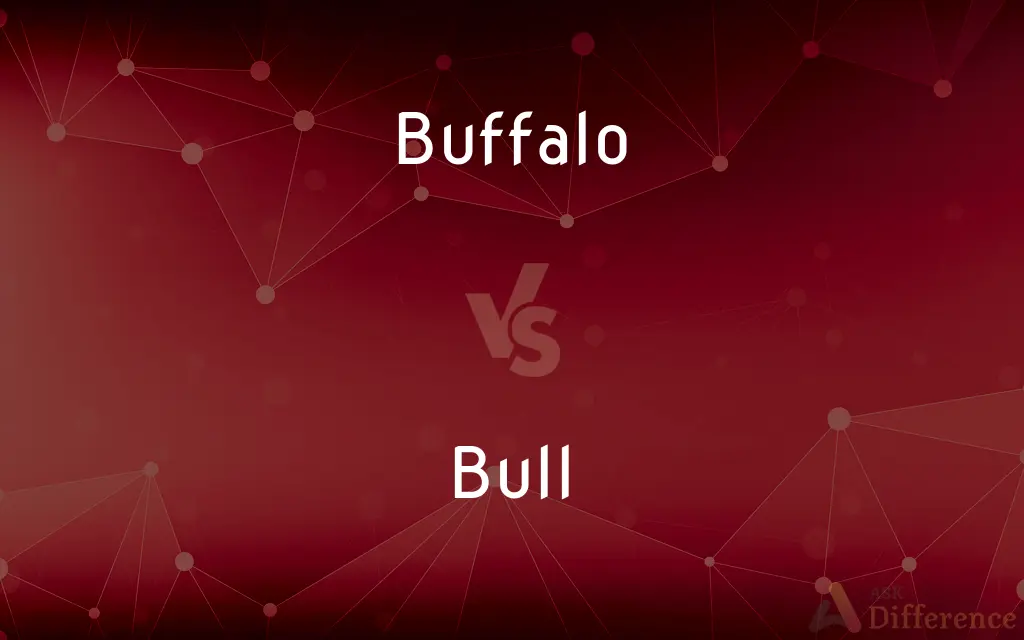Buffalo vs. Bull — What's the Difference?
By Tayyaba Rehman & Maham Liaqat — Updated on March 15, 2024
Buffalo are large, herbivorous animals with distinctive horns, living primarily in grasslands; bulls are male cattle, known for their strength and used in farming and rodeos.

Difference Between Buffalo and Bull
Table of Contents
ADVERTISEMENT
Key Differences
Buffalo, like the American bison and African buffalo, are part of distinct species and are known for their large size, heavy build, and significant roles in their ecosystems. They are primarily found in grasslands and are crucial for maintaining ecological balance. On the other hand, bulls are male members of the cattle family, specifically bred for their physical strength and utility in agricultural practices, including breeding and plowing fields.
Buffaloes have a diverse range of species, including the water buffalo in Asia and the bison in North America. These species play pivotal roles in their habitats, from seed dispersal to controlling vegetation growth. Whereas bulls, belonging to a single species but various breeds, are more homogenously used across different cultures for labor, meat production, and as a symbol in sporting events like bullfighting and rodeos.
The social structure of buffalo herds is complex, with both males and females playing significant roles in the hierarchy and protection of the group. Buffaloes are known for their protective behavior towards the young and the herd. In contrast, bulls are often isolated or kept in smaller groups to manage aggression and for breeding purposes, focusing on genetic improvement and livestock management.
Buffalo are adapted to a variety of climates, from the cold regions inhabited by bison to the wetlands for water buffaloes. This adaptability has made them integral to various cultures around the world. Bulls, while versatile, are primarily adapted to domesticated environments and are extensively managed to suit agricultural and entertainment needs.
The conservation status of buffalo varies widely, with some species like the American bison having been brought back from the brink of extinction, highlighting efforts for ecological preservation. Bulls, being part of domestic cattle populations, are not typically considered in conservation terms but rather are viewed through agricultural productivity and sustainability lenses.
ADVERTISEMENT
Comparison Chart
Species
Belongs to different species, including bison and buffalo.
Male members of one species, cattle.
Habitat
Grasslands, savannas, and forests.
Domesticated, including farms and ranches.
Role in Ecosystem
Seed dispersal, vegetation control.
Primarily for breeding and agricultural work.
Social Structure
Live in large herds with complex social hierarchies.
Often kept isolated or in small groups to manage aggression.
Adaptability
Adapted to a wide range of climates.
Mostly adapted to domesticated environments.
Compare with Definitions
Buffalo
Known for their role in agriculture and transportation in some cultures.
In Asia, water buffaloes are essential for plowing rice fields.
Bull
Known for their strength and muscular build.
Bulls are often used in rodeos because of their power and aggression.
Buffalo
Species include the African buffalo and the Asian water buffalo.
The African buffalo is known for its unpredictable nature.
Bull
Plays a key role in meat production and dairy industries.
Genetic qualities of bulls significantly impact the quality of beef and milk.
Buffalo
A large herbivorous animal with distinct horns, living in herds.
The American bison, often called a buffalo, roams freely in Yellowstone National Park.
Bull
Involved in sporting events like bullfighting and rodeos.
Bullfighting is a traditional sport in Spain, showcasing the bravery of matadors against bulls.
Buffalo
Found primarily in grasslands and forests.
Buffaloes play a crucial role in their ecosystems, promoting biodiversity.
Bull
A male member of the cattle family, used for breeding.
The farmer selected his strongest bull for the breeding season.
Buffalo
Represented in various cultures as symbols of strength and abundance.
In Native American cultures, the buffalo is a sacred symbol of life.
Bull
Symbolizes strength and virility in many cultures.
The bull is a common figure in ancient mythology, representing fertility.
Buffalo
Any of several large African and Asian ruminant mammals of the family Bovidae, such as the water buffalo and the African buffalo.
Bull
An uncastrated male bovine animal
Bull calves
Buffalo
The American bison (Bison bison).
Bull
A bullseye
Aim for the bull!
Buffalo
The flesh of the American bison, used as food.
Bull
A person who buys shares hoping to sell them at a higher price later.
Buffalo
Any of several North American suckers of the genus Ictiobus, having a dark body and an arched back. Also called buffalo fish.
Bull
A papal edict
The Pope issued a bull of excommunication
Buffalo
To intimidate or frighten, as by a display of authority
“The board couldn't buffalo the federal courts as it had the Comptroller” (American Banker).
Bull
Stupid or untrue talk or writing; nonsense
Much of what he says is sheer bull
Buffalo
To confuse or deceive
“Too often ... job seekers have buffaloed lenders as to their competency and training” (H. Jane Lehman).
Bull
Push or move powerfully or violently
He bulled the motor cycle clear of the tunnel
Buffalo
Any of the Old World mammals of the family Bovidae, such as the Cape buffalo, Syncerus caffer, or the water buffalo Bubalus bubalis.
Bull
(of a cow) behave in a manner characteristic of being on heat.
Buffalo
A related North American animal, the American bison, Bison bison.
Bull
An exceptionally large, strong, and aggressive person.
Buffalo
Ellipsis of buffalo robe
Bull
An optimist, especially regarding business conditions.
Buffalo
The buffalo fish (Ictiobus spp.).
Bull
A person who buys commodities or securities in anticipation of a rise in prices or who tries by speculative purchases to effect such a rise.
Buffalo
A nickel.
Bull
(Slang) A police officer or detective.
Buffalo
(transitive) To hunt buffalo.
Bull
Foolish, deceitful, or boastful language.
Buffalo
To outwit, confuse, deceive, or intimidate.
Bull
Insolent talk or behavior.
Buffalo
To pistol-whip.
Bull
An official document issued by the pope and sealed with a bulla.
Buffalo
A species of the genus Bos or Bubalus (Bubalus bubalus), originally from India, but now found in most of the warmer countries of the eastern continent. It is larger and less docile than the common ox, and is fond of marshy places and rivers.
Bull
The bulla used to seal such a document.
Buffalo
A very large and savage species of the same genus (Syncerus Caffer syn. Bubalus Caffer) found in South Africa; - called also Cape buffalo.
Bull
A gross blunder in logical speech or expression.
Buffalo
Any species of wild ox.
Bull
See Taurus.
Buffalo
The bison of North America.
Bull
To push; force.
Buffalo
A buffalo robe. See Buffalo robe, below.
Bull
To push ahead or through forcefully
"He bulls through the press horde that encircles the car" (Scott Turow).
Buffalo
The buffalo fish. See Buffalofish, below.
Bull
Male.
Buffalo
Large shaggy-haired brown bison of North American plains
Bull
Large and strong like a bull.
Buffalo
A city on Lake Erie in western New York (near Niagara Falls)
Bull
Characterized by rising prices
A bull market.
Buffalo
Meat from an American bison
Bull
Specifically, one that is uncastrated.
Buffalo
Any of several Old World animals resembling oxen including, e.g., water buffalo; Cape buffalo
Bull
A male of domesticated cattle or oxen of any age.
Buffalo
Intimidate or overawe
Bull
A large, strong man.
Bull
(finance) An investor who buys (commodities or securities) in anticipation of a rise in prices.
Bull
(slang) A policeman.
Bull
(US) Specifically, a policeman employed in a railroad yard.
Bull
An elderly lesbian.
Bull
A crown coin; its value, {{5 shillings.}}
Bull
(UK) bullseye
Bull
The central portion of a target, inside the inner and magpie.
Bull
A man or boy (derived from the Philadelphia English pronunciation of “boy”, which is practically a homophone of “bull”)
Bull
Clipping of bullshit
Bull
(obsolete) A drink made by pouring water into a cask that previously held liquor.
Bull
A papal bull, an official document or edict from the Pope.
Bull
A seal affixed to a document, especially a document from the Pope.
Bull
A lie.
Bull
Nonsense.
Bull
(obsolete) A bubble.
Bull
Large and strong, like a bull.
Bull
(finance) Of a market in which prices are rising (compare bear).
Bull
Stupid.
Bull
To force oneself (in a particular direction).
He bulled his way in.
Bull
To be in heat; to be ready for mating with a bull.
Bull
To mate with a cow or heifer.
Bull
To endeavour to raise the market price of.
To bull railroad bonds
Bull
To endeavour to raise prices in.
To bull the market
Bull
To publish in a Papal bull
Bull
To mock; to cheat.
Bull
(intransitive) To lie, to tell untruths.
Bull
To polish boots to a high shine.
Bull
The male of any species of cattle (Bovidæ); hence, the male of any large quadruped, as the elephant; also, the male of the whale.
Bull
One who, or that which, resembles a bull in character or action.
Bull
Taurus, the second of the twelve signs of the zodiac.
At last from Aries rolls the bounteous sun,And the bright Bull receives him.
Bull
A ludicrously false statement; nonsense. Also used as an expletive.
Bull
A seal. See Bulla.
Bull
A letter, edict, or respect, of the pope, written in Gothic characters on rough parchment, sealed with a bulla, and dated "a die Incarnationis," i. e., "from the day of the Incarnation." See Apostolical brief, under Brief.
A fresh bull of Leo's had declared how inflexible the court of Rome was in the point of abuses.
Bull
A grotesque blunder in language; an apparent congruity, but real incongruity, of ideas, contained in a form of expression; so called, perhaps, from the apparent incongruity between the dictatorial nature of the pope's bulls and his professions of humility.
And whereas the papist boasts himself to be a Roman Catholic, it is a mere contradiction, one of the pope's bulls, as if he should say universal particular; a Catholic schimatic.
Bull
Of or pertaining to a bull; resembling a bull; male; large; fierce.
Bull
A large and strong and heavyset man;
He was a bull of a man
A thick-skinned bruiser ready to give as good as he got
Bull
Obscene words for unacceptable behavior;
I put up with a lot of bullshit from that jerk
What he said was mostly bull
Bull
A serious and ludicrous blunder;
He made a bad bull of the assignment
Bull
Uncomplimentary terms for a policeman
Bull
An investor with an optimistic market outlook; an investor who expects prices to rise and so buys now for resale later
Bull
(astrology) a person who is born while the sun is in Taurus
Bull
The second sign of the zodiac; the sun is in this sign from about April 20 to May 20
Bull
The center of a target
Bull
A formal proclamation issued by the pope (usually written in antiquated characters and sealed with a leaden bulla)
Bull
Mature male of various mammals of which the female is called `cow'; e.g. whales or elephants or especially cattle
Bull
Push or force;
He bulled through his demands
Bull
Try to raise the price of stocks through speculative buying
Bull
Talk through one's hat;
The politician was not well prepared for the debate and faked it
Bull
Advance in price;
Stocks were bulling
Common Curiosities
What are the main differences between a buffalo and a bull?
Buffalo are wild, large herbivores from various species, while bulls are domesticated, male cattle used primarily for breeding.
Are bulls aggressive animals?
Bulls can exhibit aggressive behavior, especially during mating seasons or when threatened, which is why they're often managed carefully on farms.
Can buffalo be found worldwide?
Buffalo species like the African buffalo and Asian water buffalo are native to specific regions, unlike domesticated bulls found globally.
Do buffalo play a role in agriculture?
In some cultures, particularly in Asia, water buffaloes are vital for plowing fields and transporting goods.
Why are bulls used in rodeos?
Bulls are chosen for their strength, agility, and sometimes unpredictable behavior, making rodeos more challenging and entertaining.
Are buffalo considered domestic animals?
While the water buffalo is domesticated in some regions for agricultural purposes, most buffalo species are wild.
Can bulls be found in the wild?
While most bulls are domesticated, there are wild cattle species; however, these are not bulls in the agricultural sense.
Is there a difference in the diet of buffalo and bulls?
Both primarily feed on grasses, but buffalo, being wild, might have a more diverse diet depending on their habitat.
What's the conservation status of buffalo?
It varies by species; for example, the American bison has seen successful conservation efforts, while others may still face threats.
How do buffalo contribute to their ecosystems?
They help control vegetation, disperse seeds, and create habitats for other wildlife through their grazing patterns.
What is the significance of bulls in culture?
Bulls have been symbols of strength, fertility, and virility in many cultures, from ancient mythologies to modern sports.
How are bulls involved in dairy production?
Bulls contribute genetically to dairy herds, affecting milk production qualities and the overall health of future generations.
What adaptations help buffalo survive in different climates?
Buffalo species have developed various adaptations, from thick fur for cold climates to water-reliant behaviors for tropical regions.
What are the social structures of buffalo herds?
Buffalo herds have complex social structures with defined roles and hierarchies, promoting group cohesion and protection.
How do buffalo and bulls impact human cultures?
Both have been integral to human societies, from agricultural and economic contributions to cultural symbols and sports.
Share Your Discovery

Previous Comparison
Ram vs. Sheep
Next Comparison
Announce vs. DeclareAuthor Spotlight
Written by
Tayyaba RehmanTayyaba Rehman is a distinguished writer, currently serving as a primary contributor to askdifference.com. As a researcher in semantics and etymology, Tayyaba's passion for the complexity of languages and their distinctions has found a perfect home on the platform. Tayyaba delves into the intricacies of language, distinguishing between commonly confused words and phrases, thereby providing clarity for readers worldwide.
Co-written by
Maham Liaqat














































